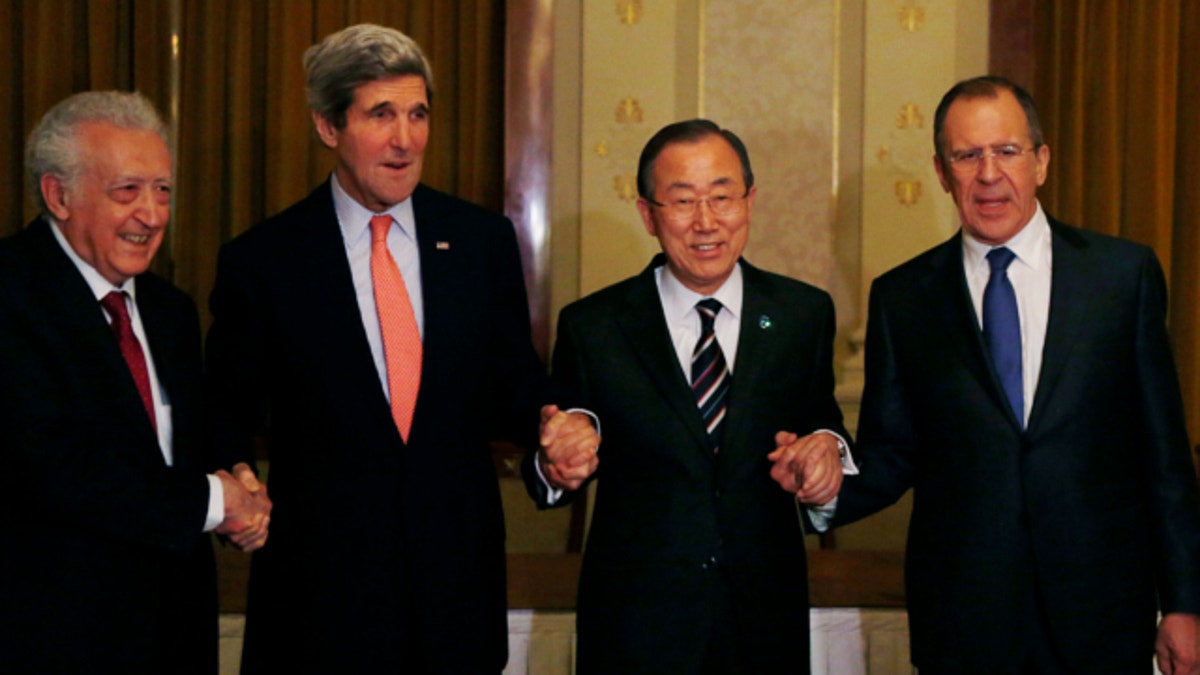
From left: UN-Arab League Envoy to Syria Lakhdar Brahimi, United Jan. 21, 2014: States Secretary of State John Kerry, UN Secretary-General Ban Ki-moon and Russia's Foreign Minister Sergey Lavrov join hands after their international conference on ending the crisis in Syria in Montreux, Switzerland. (AP)
Syrian President Bashar Assad can have no place in a transition government because he has lost the legitimacy to govern, Secretary of State John Kerry said Wednesday at the launch of peace talks aimed at ending a three-year civil war that that has claimed thousands of lives in Syria.
"We see only one option, negotiating a transition government born by mutual consent," Kerry said, according to Reuters. "That means that Bashar Assad will not be part of that transition government. There is no way, no way possible, that a man who has led a brutal response to his own people can regain legitimacy to govern."
The Syrian government, members of the opposition and delegates from around the world gathered Wednesday in Montreux, Switzerland, for the talks, marking the first time the government led by Assad and Western-backed members of the rebellion have met face-to-face.
U.N. Secretary-General Ban Ki-moon, who opened the talks, said the negotiations face "formidable" challenges.
"We know that it has been an extremely difficult path to reach this point. We have lost valuable time and many many lives. Let me not mince words, the challenges before you and before all of us are formidable. But your presence here raises hope," he said in his opening remarks.
But the Syrian National Coalition, the umbrella group representing the opposition, is in disarray, with little influence on rebel brigades fighting in Syria. And Iran, which is one of Assad's major backers, was invited and then disinvited at the last minute.
Syrian Foreign Minister Walid al-Moallem, who the is leading the Damascus delegation, rejected Kerry's assertion that Assad has lost legitimacy and said no one has the right to remove him except Syrians.
"We came here as representatives of the Syrian people and state and everybody should know that nobody in this world has the right to withdraw the legitimacy of a president or government ... other than the Syrians themselves,'' al-Moallem said, according to Reuters.
Al-Moallem also refused to give up the podium to Ban Ki-moon, telling the U.N. chief: "You live in New York, I live in Syria."
Ahmad al-Jarba, head of Syria's Western-backed opposition, said any discussion of Assad staying in power will effectively end peace talks before they have begun. He said "this is the only topic for us," speaking minutes after Assad's foreign minister.
The State Department said Wednesday that remarks from Syria's foreign minister were not in keeping with the spirit or aims of the gathering, which is intended to begin the process of forming a transitional government. Spokeswoman Jen Psaki said that instead of laying out a "positive vision" for Syria's future, al-Moallem chose "inflammatory rhetoric."
More than 130,000 people have died in Syria's conflict, and more than a quarter of the population of 23 million now live as refugees, either within Syria or in neighboring countries. Fighters who took up weapons against Assad have turned their guns on each other, trapping ordinary Syrians in the violence of two parallel wars.
Islamic militants and foreign Al Qaeda-linked fighters joined the war against Assad — and reports of human rights abuses by the opposition soared, including mass killings of prisoners, beheadings and floggings. In Aleppo last year, Al Qaeda-linked militants shot to death a 15-year-old coffee vendor in front of his parents, accusing him of being an "infidel" for allegedly mentioning Islam's Prophet Muhammad in vain.
In the latest sign of the brutality, three international war crimes prosecutors released a report concluding that the Syrian government is behind the "systematic killing" of approximately 11,000 detainees between March 2011 and August 2013.
The Guardian, which obtained access to the report, says that the source of the report's claims is a military police photographer who secretly worked with a Syrian rebel group before defecting and fleeing the country. The report could not be independently confirmed.
State Department spokeswoman Marie Harf told reporters Tuesday the report suggests "widespread and apparently systematic violations" by the Assad regime.
"As we've said before, the Syrian regime is responsible for war crimes and crimes against humanity. These most recent images...are extremely disturbing," Harf said. "They’re horrible to look at, and they illustrate apparent actions that would be serious international crimes."
The Associated Press contributed to this report.
